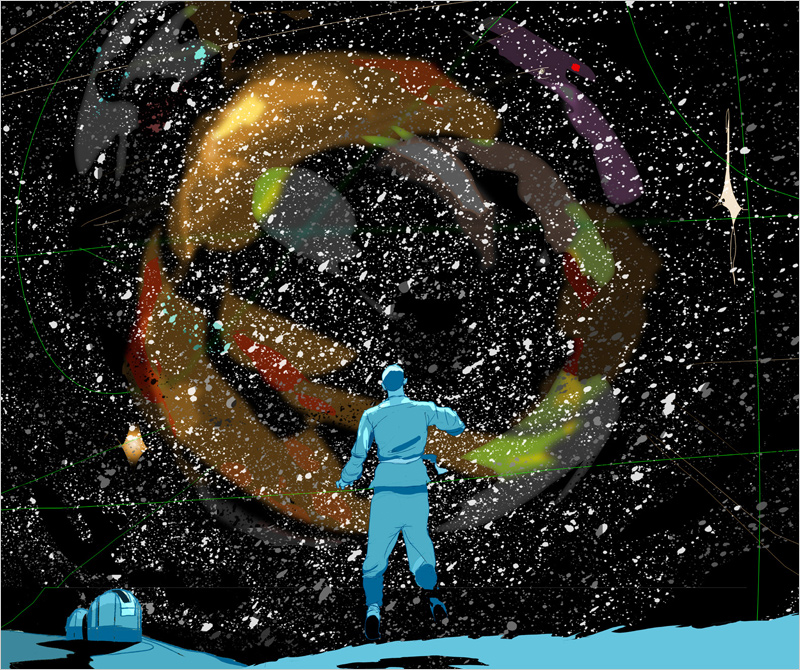A man of positive reasoning will discard all thoughts that are not his own. They are not authentic; he has not found them through his own experience. He has accumulated from others, borrowed. They are dirty. They have been in many hands and heads. A man of thinking will not borrow. He would like to have a fresh thought of his own. And if you are positive, and if you look at the beauty, at the truth, at the goodness, at the flowers, if you become capable of seeing even in the darkest night that the morning is coming nearer, you will become capable of thinking.
Then you can create your own thoughts. And a thought that is created by you is really potential: it has a power of its own. These thoughts that you have borrowed are almost dead because they have been traveling – traveling for millions of years. Their origin is lost: they have lost all contact with their origin. They are just like dust floating all around. You catch them. Sometimes you even become aware of it, but because your awareness is such that it cannot see through things…
Sometimes you are sitting. Suddenly you become sad for no reason at all. You cannot find the reason. You look around, there is no reason; nothing there, nothing has happened. You are just the same and suddenly a sadness takes. A thought is passing; you are just in the way. It is an accident. A thought was passing like a cloud – a sad thought released by someone. It is an accident. You are in the grip. Sometimes a thought persists. You don’t see why you go on thinking about it. It looks absurd; it seems to be of no use. But you cannot do anything. It goes on knocking at the gate. “Think me,” it says. A thought is waiting at the door knocking. It says, “Give space. I would like to come in.”
Each thought has its own life. It moves. And it has much power, and you are so impotent because you are so unaware, so you are moved by thoughts. Your whole life consists of such accidents. You meet people, and your whole life pattern changes. Something enters in you. Then you become possessed, and you forget where you were going. You change your direction; you follow this thought. And this is just an accident. You are like children.
Patanjali says this is not thinking. This is the state of absence of thinking; this is not thinking. You are a crowd. You have not a center within you which can think. When one moves in the discipline of Vitarka – right reasoning, then one becomes by and by capable of thinking. Thinking is a capacity; thoughts are not. Thoughts can be learned from others; thinking, never. Thinking you have to learn yourself.
And this is the difference between the old Indian schools of learning and the modern universities: in the modern universities you are getting thoughts; in the ancient schools of learning, wisdom schools, they were teaching thinking, not thoughts.
Thinking is a quality of your inner being. What does thinking mean? It means to retain your consciousness, to remain alert and aware, to encounter a problem. A problem is there: you face it with your total awareness. And then arises an answer – a response. This is thinking. A question is posed; you have a ready-made answer. Before even you have thought about it, the answer comes in. Somebody says, “Is there God?” And he has not even said and you say, “Yes.” You nod your wooden head; you say, “Yes, there is.”
Is it your thought? Have you thought about the problem right now, or you carry a ready-made answer within your memory? Somebody gave it to you – your parents, your teachers, your society. Somebody has given it to you, and you carry it as a precious treasure, and this answer comes from that memory.
A man of thinking uses his consciousness each time there is a problem. Freshly, he uses his consciousness. He encounters the problem, and then arises a thought within him which is not part of memory. This is the difference. A man of thoughts is a man of memory; he has no thinking capacity. If you ask a question which is new, he will be at a loss. He cannot answer. If you ask a question which he knows the answer to, he will immediately answer. This is the difference between a pundit and a man who knows; a man who can think.
Patanjali says Vitarka – right reasoning, leads to reflection – Vichar. Reflection – Vichar, leads to bliss. This is the first glimpse, of course, and it is a glimpse. It will come and it will be lost. You cannot hold it for long. It was going to be just a glimpse, as if for a moment a lightning happened and you saw all darkness disappear. But again the darkness is there – as if clouds disappeared and you saw the moon for a second – again clouds are there.
Or, on a sunny morning, near the Himalayas, for a moment you can have the glimpse of the Gourishankar – the highest peak. But then there is mist, and then there are clouds, and the peak is lost. This is satori. That’s why, never try to translate satori as samadhi. Satori is a glimpse. Much has to be done after it is attained. In fact, the real work starts after the first satori, first glimpse, because then you have tasted the infinite. Now a real authentic search starts. Before it, it was just so-so, lukewarm, because you were not really confident, certain, what you are doing, where you are going, what is happening.
Before it, it was a faith, a trust. Before it a Master was needed to show you, to bring you back again and again. But after satori has happened, now it is no more a faith. It has become a knowing. Now the trust is not an effort. Now you trust because your own experience has shown you. After the first glimpse, the real search starts. Before it you are just going round and round. Right reasoning leads to right reflection, right reflection leads to a state of bliss, and this state of bliss leads to a sense of pure being.
A negative mind is always egoist. That is the impure state of being. You feel “I”, but you feel “I” for wrong reasons. Just watch. Ego feeds on no. Whenever you say no, ego arises. Whenever you say yes, ego cannot arise because ego needs fight, ego needs challenge, ego needs to put itself against someone, something. It cannot exist alone; it needs duality. An egoist is always in search of fight – with someone, with something, with some situation. He is always trying to find something to say no – to win over, to be victorious.
Ego is violent, and no is the subtlest violence. When you say no for ordinary things, even their ego arises. A small child says to the mother, “Can I go out to play?” And she says “No Nothing much was involved, but when the mother says “No!” She feels she is someone. You go to the railway station and you ask for a ticket and the clerk simply doesn’t look at you. He goes on working even if there is no work. But he is saying, “No! Wait!” He feels he is someone, somebody. That’s why, in offices everywhere, you will hear no. Yes is rare – very rare. An ordinary clerk can say no to anybody, whomsoever you are. He feels powerful.
No gives you a sense of power – remember this. Unless it is absolutely necessary, never say no. Even if it is absolutely necessary, say it in such an affirmative way that the ego doesn’t arise. You can say. Even no can be said in such a way that it appears like yes. You can say yes in such a way that it looks like no. It depends on the tone; it depends on the attitude; it depends on the gesture.
Remember this: for seekers, it has to be remembered constantly that you have to live continuously in the aroma of yes. That is what a man of faith is: he says yes. Even when no was needed, he says yes. He doesn’t see that there is any antagonism in life. He affirms. He says yes to his body, he says yes to his mind, he says yes to everybody, he says yes to the total existence. The ultimate flowering happens when you can say a categorical yes, with no conditions. Suddenly the ego falls; it cannot stand. It needs the props of no. The negative attitude creates ego. The positive attitude – the ego drops, and then the being is pure.
Sanskrit has two words for “I” – ahankar and asmita. It is difficult to translate. ahankar is the wrong sense of “I” which comes from saying no. Asmita is the right sense of “I” which comes from saying yes. Both are “I”. One is impure: no is the impurity. You negate, destroy. No is destructive, a very subtle destruction. Never use it. Drop it as much as you can. Whenever you are alert, don’t use it. Try to find a roundabout way. Even if you have to say it, say it in such a way that it has the appearance of yes. By and by you will become attuned, and you will feel such a purity coming to you through yes.
Then asmita: asmita is egoless ego. No feeling of “I” against anybody. Just feeling oneself without putting against anybody. Just feeling your total loneliness, and the total loneliness, the purest of states. “I am” – when we say “I” is ahankar; “am” is asmita, just the feeling of am-ness with no “I” to it, just feeling the existence, the being Yes is beautiful, no is ugly.
Tags: Ananda Patanjali Vichar Vitarka










